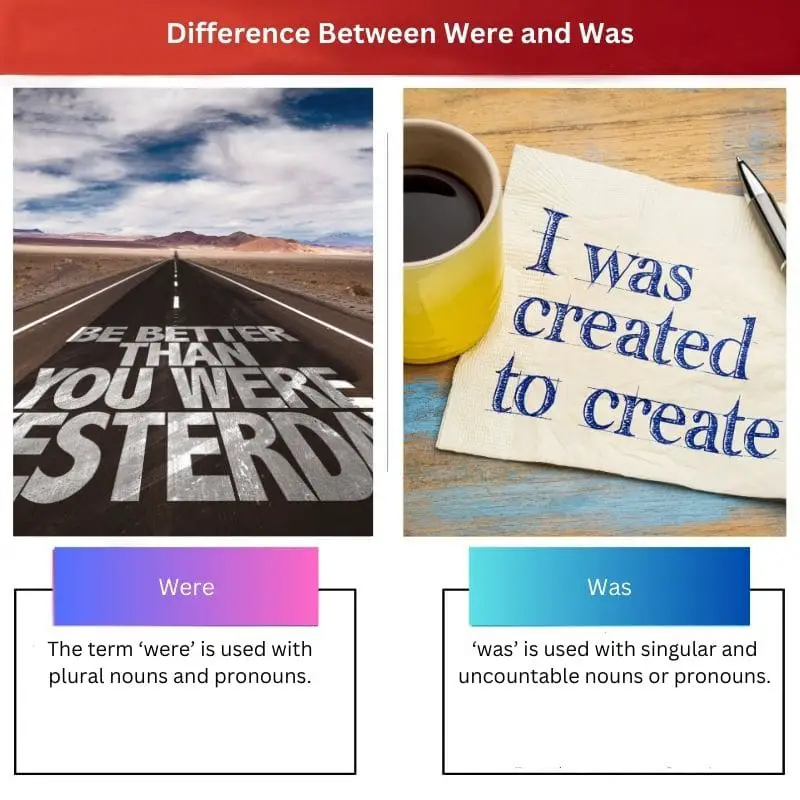“Was” is used when referring to singular subjects in the past tense, such as “He was at the party last night.” Conversely, “were” is used for plural subjects or the second person singular (you), as in “They were happy” or “You were late.”
Key Takeaways
- “Were” is the past tense plural form of “to be,” while “was” is the past tense singular form of “to be.”
- “Were” is used with plural subjects, while “was” is used with singular subjects.
- “Were” and “was” describe past events, actions, or states of being.
Were vs Was
The difference between Were and Was is that we use the term ‘were’ when referring to several parties or entities. For example:” The incident deeply grieved my parents.” We use the term ‘was’ when referring to a single entity or party. For example: “Mary was in Bangalore last month.”

As you can understand that both terms have got different meanings, and thus, it is important to use the correct word to make a sentence meaningful and accurate.
Comparison Table
| Feature | Were | Was |
|---|---|---|
| Grammatical Function | Past tense verb conjugation | Past tense verb conjugation |
| Subject Agreement | Used with plural subjects (you, we, they) and second-person singular (you) | Used with singular subjects (I, he, she, it) |
| Mood | Can also be used in the subjunctive mood to express hypothetical or unreal situations | Primarily used in the indicative mood to express statements of fact in the past |
| Examples | * “We were at the park yesterday.” (Indicative mood, plural subject) * “If I were you, I wouldn’t go.” (Subjunctive mood, hypothetical situation) | * “He was surprised to see me.” (Indicative mood, singular subject) * “I wish I was there.” (Subjunctive mood, unreal situation) |
What is ‘Were’?
“Were” is a past tense form of the verb “to be.” It is used primarily with plural subjects, including nouns and pronouns such as “they,” “we,” and “you” (in the plural sense). However, it is also used with the singular pronoun “you” when addressing someone in a formal or plural manner. “Were” is not used with first and third person singular subjects, for which “was” is used instead.
Usage
- Plural Subjects: “Were” is used with plural subjects to indicate past actions, states, or conditions. For example, “They were playing in the park” or “We were discussing the project.”
- Second Person Singular (You): In English, “you” can be singular or plural. When addressing someone formally or when referring to multiple people, “were” is used. For instance, “You were late for the meeting” or “Were you at the concert last night?”
- Hypothetical Situations: “Were” is also used in subjunctive mood to express hypothetical or unreal situations. For example, “If I were a millionaire, I would travel the world.”
Conjugation
The conjugation of “were” in the past tense is consistent across all persons and numbers, making it an irregular verb:
- Singular: I/he/she/it was
- Plural and Second Person Singular: You/we/they were

What is ‘Was’?
“Was” is the past tense form of the verb “to be.” It is used primarily with singular subjects, including nouns and pronouns such as “he,” “she,” “it,” and singular nouns. “Was” is employed to denote actions, states, or conditions that occurred in the past.
Usage
- Singular Subjects: “Was” is utilized with singular subjects to describe past actions, states, or conditions. For example, “He was studying all night” or “She was happy to see her friends.”
- First Person Singular (I): When referring to oneself in the past, “was” is used. For instance, “I was at the library yesterday” or “I was feeling tired after work.”
- Third Person Singular (He/She/It): In English, “was” is used with third person singular subjects, such as “he,” “she,” and “it.” For example, “He was late for the appointment” or “She was a talented musician.”
Conjugation
The conjugation of “was” in the past tense varies depending on the subject, but it remains the same for all singular subjects:
- First Person Singular: I was
- Third Person Singular: He/she/it was

Main Differences Between ‘Were’ and ‘Was’
- Subject Agreement:
- “Was” is used with singular subjects, such as “he,” “she,” “it,” and “I.”
- “Were” is used with plural subjects, like “they,” “we,” and the second person singular “you” in past tense constructions.
- Conjugation:
- “Was” remains the same across singular subjects: “I was,” “he was,” “she was,” “it was.”
- “Were” is consistent across plural subjects and the second person singular “you”: “we were,” “they were,” “you were.”
- Verb Function:
- “Was” indicates past tense actions, states, or conditions for singular subjects.
- “Were” indicates past tense actions, states, or conditions for plural subjects or the second person singular “you.”

It could arguably be said to be a perfect explanation!
One would have to wonder who could argue otherwise.
An exemplary explication. One has to wonder who could still be perplexed by this.
The cognitively challenged, perhaps?
Indeed, one cannot help but wonder.
For those with the mental acuity to understand, this should be enlightening.
One could hope for a discerning readership, at least.
One might be tempted to say that a child of five would find this comprehensible.
That would not be an exaggeration.
This elucidative statement could save us all time and heartache when communicating.
It will undoubtedly obviate much confusion.
An enlightening and astute disquisition. It should ameliorate the errant use of these terms.
Surely, it will edify many.
One hopes, however, that the intended audience will grasp this elucidation.
This explanation should put an end to the perplexing ambiguity of ‘were’ and ‘was’. Only a fool wouldn’t understand the proper use after reading this.
One could consider it a great victory over confusion.
One could conclude that it is not a complicated subject unless you are an imbecile.
It would appear so, to any intelligent individual.
Not that we should expect anything different.
Perhaps if people took the time to properly educate themselves, we wouldn’t be in this situation to begin with.
It could be beneficial to society in general.
Maybe if people had a better education…
A well-articulated exegesis. It should confer a profound understanding to the uninformed.
One cannot be too sanguine about that prospect.
Hopefully, the uneducated will heed this discourse.